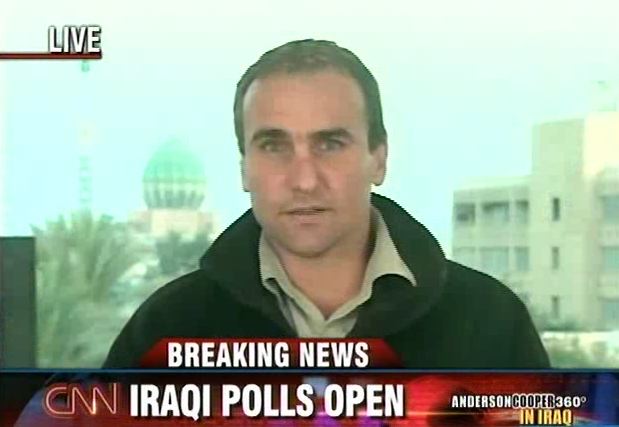AC: Election day in Iraq

Length: 4:31
LARGE (53.0 MB) ----- SMALL (5.2 MB)
ANDERSON COOPER: Michael Ware, TIME Magazine's Baghdad bureau chief is standing by for us in Baghdad. We're going to talk to him shortly.
We're going to take a quick break.
We actually do have Michael Ware and it's live television and it is Iraq. Let's go to Michael in Baghdad. Michael, one of the big stories this week, of course, is that insurgents -- Sunni based insurgents -- were telling Al-Zarqawi, were telling Zarqawi's groups here in Iraq, foreign terrorists, not to attack on polling day. That is a huge development.
MICHAEL WARE, TIME MAGAZINE: Yes it is, Anderson. We've seen this play out once before on the October 15 referendum. On that day there were zero suicide bombings. Unlike the first election in January, when there were seven. That's a result of the Baathist insurgents and the nationalist insurgents telling Zarqawi to sit down for one day -- "allow us and our people to participate in this process."
Now the Baathists, the nationalists and the Iraqi Islamic groups have done that again today. They've urged their people to participate. This means Zarqawi must restrain from attacking. He is very much the wild card today.
And already now here in Baghdad, we've heard the first big explosion. So, who knows what's going to happen -- Anderson.
COOPER: Michael, I should also just tell our viewers we are -- we understand Nic Robertson is fine. He is off camera. We're continuing to keep up the scene in Ramadi where Nic sort of had to quickly leave the scene. But we're going to continue that shot up to try to get the latest developments out of Ramadi.
Michael, what -- I mean, what is the significance of today? I mean, how important do you think this is in terms of the insurgency? What impact does a high turnout have on the future of the violence here?
WARE: Well, the U.S. diplomats have hoped that every Sunni vote would be a vote against the violence and against the insurgency. However, that's not going to be the case. As we saw with the referendum, the insurgents are pursuing a two-track policy. One is military, one is political. They call it the bullet and the ballots. They're trying to use military pressure to work on a political front and for the politics to assist in the military campaign. So we will not see any cessation of the fighting after this election.
And just like in Ramadi, where Nic is right now, this is a city that Zarqawi controls. So it's in places like Ramadi where we will see the true nature of the insurgency. Who is in charge out there? If Zarqawi does not restrain himself in Ramadi, that is going to tell us many things about the state of the fight.
COOPER: But if he does restrain himself, does that mean that the Sunni insurgents -- who are, in terms of numbers, certainly have the greatest numbers in this insurgency; I mean, Zarqawi, the foreign terrorists are by all accounts a relatively small percentage, though in terms of lethality and political impact they're perhaps the greatest -- if he does not attack today, does that mean that it is the Sunni insurgents who are really in control, who are really running this thing or will be in the future?
WARE: Well, it certainly shows us that they have regained the upper hand. In 2003, this was very much an Iraqi nationalist fight. However, throughout 2004, we saw Zarqawi with his money and with the zealotry and commitment of his foreign fighters, take over the insurgency, or he certainly gained the momentum. Throughout this year we've seen much more of a struggle out there among the insurgents. And as Zarqawi has had to fill the ranks of his Al Qaeda organization with Iraqis, we have seen it soften. We have seen it begin to listen much more to the Iraqi insurgent groups. So today will tell us a great deal about the nature of these relationships. And it could bode well for the U.S. mission as American diplomats and military officers reach out to the Iraqi Baathists and nationalist insurgent groups. If we see them with the upper hand, that means this program of outreach has much better prospects for success for quelling the violence.
COOPER: Michael Ware, of "TIME Magazine," Baghdad bureau chief. Michael, thanks, it's always good to talk to you -- especially today.
